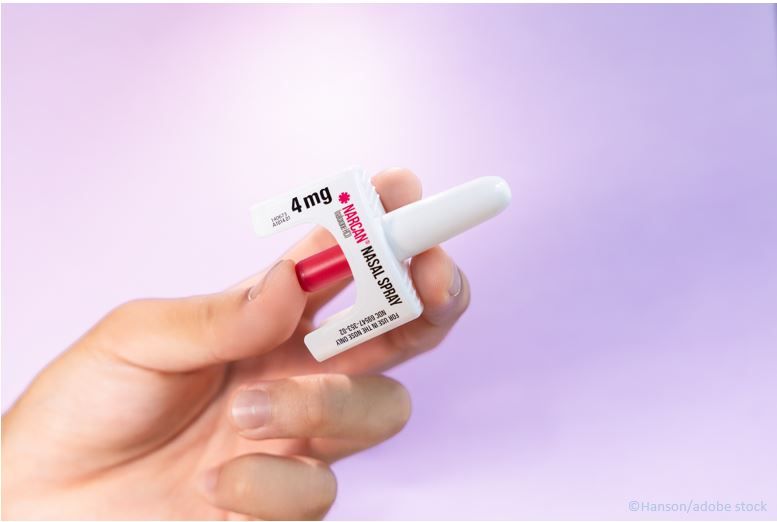- Clinical Technology
- Adult Immunization
- Hepatology
- Pediatric Immunization
- Screening
- Psychiatry
- Allergy
- Women's Health
- Cardiology
- Pediatrics
- Dermatology
- Endocrinology
- Pain Management
- Gastroenterology
- Infectious Disease
- Obesity Medicine
- Rheumatology
- Nephrology
- Neurology
- Pulmonology
FDA Grants Priority Review to sNDA for OTC Intranasal Naloxone HCl
The US Food and Drug Administration on Tuesday accepted a supplemental new drug application (sNDA) for Narcan (naloxone hydrochloride) nasal spray as an over-the-counter (OTC) emergency treatment for opioid overdose and also granted the application Priority Review, according to a news release from manufacturer Emergent BioSolutions.
If the FDA approves the prescription-to-OTC switch, naloxone HCl would be the first 4 mg naloxone nasal spray available OTC in the US, according to the company.

“We are taking this step to help address the rising and devastating number of opioid overdoses and fatalities happening across the country,” said Robert G. Kramer, president and CEO of Emergent BioSolutions, in the company release. “We look forward to working with the FDA to advance our application under priority review designation and believe in the scientific evidence that supports the efficacy and safety of Narcan nasal spray as an over-the-counter option for opioid overdose reversal.”
FDA acceptance of the sNDA comes just several weeks after the agency announced preliminary data that indicated certain naloxone products may “have the potential to be safe and effective for use as directed in nonprescription drug labeling without the supervision of a healthcare practitioner.” In the Federal Register notice dated November 16, 2022, the FDA encouraged manufacturers of prescription naloxone products to contact the agency “as early as possible to initiate a discussion about a possible switch” to OTC use.
Intranasal naloxone HCl spray was approved in 2015 for community use against known or suspected opioid overdose. The sNDA accepted this week includes post-marketing data covering more than 5 years in support of safe and effective use of naloxone HCl as well as findings from qualitative human factors studies of performance when using the intranasal device.
The FDA has over the past several years has taken a variety of steps to improve naloxone access including a requirement that prescribing information for all opioid pain relievers and substance use treatments include recommendations about use of naloxone and an extension of the drug’s half-life from 24 to 36 months. The agency has also developed a model OTC Drug Facts Label that illustrates naloxone spray administration, hoping to encourage manufacturers to pursue OTC approval.
The need for broader access to overdose reversal agents is urgent as availability of synthetic opioids, primarily fentanyl, escalates. Deaths related to the laboratory-produced drugs increased nearly 60% between 2019 and 2020. In 2021, there were more than 71 000 deaths attributed to opioids containing fentanyl, according to the Centers for Disease Control & Prevention.
“Since its approval in 2015, Emergent has distributed millions of prescription Narcan devices across the U.S. to national, state and local government health departments and first responders closest to at-risk populations, including public health clinics, fire departments and police departments,” according to the release. “Accidental overdoses can happen to anyone, anywhere, at any time, and by shifting to OTC status, increased access to Narcan will help address patient needs as the opioid epidemic continues to evolve.”
The Prescription Drug User Fee Act goal date has been set for March 29, 2023.
